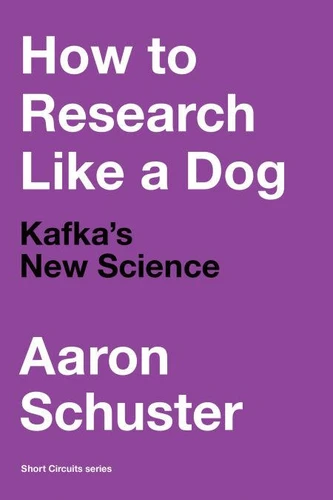How to Research Like a Dog. Kafka’s New Science
Par :Formats :
Disponible dans votre compte client Decitre ou Furet du Nord dès validation de votre commande. Le format ePub protégé est :
- Compatible avec une lecture sur My Vivlio (smartphone, tablette, ordinateur)
- Compatible avec une lecture sur liseuses Vivlio
- Pour les liseuses autres que Vivlio, vous devez utiliser le logiciel Adobe Digital Edition. Non compatible avec la lecture sur les liseuses Kindle, Remarkable et Sony
- Non compatible avec un achat hors France métropolitaine
 , qui est-ce ?
, qui est-ce ?Notre partenaire de plateforme de lecture numérique où vous retrouverez l'ensemble de vos ebooks gratuitement
Pour en savoir plus sur nos ebooks, consultez notre aide en ligne ici
- Nombre de pages352
- FormatePub
- ISBN978-0-262-36915-2
- EAN9780262369152
- Date de parution10/12/2024
- Protection num.Adobe DRM
- Taille1004 Ko
- Infos supplémentairesepub
- ÉditeurThe MIT Press
Résumé
A provocative book that proposes a new and surprising inspiration for philosophy today-the canine thinker from Kafka's story "Investigations of a Dog." Written toward the end of Kafka's life, "Investigations of a Dog" (Forschungen eines Hundes, 1922) is one of the lesser-known and most enigmatic works in the author's oeuvre. Kafka's tale of philosophical adventure is that of a lone, maladjusted dog who challenges the dogmatism of established science and pioneers an original research program in pursuit of the mysteries of his self and his world.
In How to Research Like a Dog, Aaron Schuster uses the canine as a guide dog to rediscover Kafka's fictional universe, while taking up the cause of this ingenious, possessed, melancholy, comical, and revolutionary thinker. Neither an exercise in literary criticism nor a traditional philosophical commentary, this charming and idiosyncratic book aligns itself with the research program of Kafka's dog.
It constructs an "impossible" system based on the fourfold division of nourishment, music, incantation, and freedom-or, stated a bit differently: enjoyment, art, institutions, and freedom. From Plato to Flaubert, Lispector, and Lacan, Schuster puts the dog in dialogue with psychoanalytic theory, the history of philosophy, and modern literature. Imagining the "Unknown University" that Kafka's new science calls for, the book enlists new comrades in the dog's struggle.
In How to Research Like a Dog, Aaron Schuster uses the canine as a guide dog to rediscover Kafka's fictional universe, while taking up the cause of this ingenious, possessed, melancholy, comical, and revolutionary thinker. Neither an exercise in literary criticism nor a traditional philosophical commentary, this charming and idiosyncratic book aligns itself with the research program of Kafka's dog.
It constructs an "impossible" system based on the fourfold division of nourishment, music, incantation, and freedom-or, stated a bit differently: enjoyment, art, institutions, and freedom. From Plato to Flaubert, Lispector, and Lacan, Schuster puts the dog in dialogue with psychoanalytic theory, the history of philosophy, and modern literature. Imagining the "Unknown University" that Kafka's new science calls for, the book enlists new comrades in the dog's struggle.
A provocative book that proposes a new and surprising inspiration for philosophy today-the canine thinker from Kafka's story "Investigations of a Dog." Written toward the end of Kafka's life, "Investigations of a Dog" (Forschungen eines Hundes, 1922) is one of the lesser-known and most enigmatic works in the author's oeuvre. Kafka's tale of philosophical adventure is that of a lone, maladjusted dog who challenges the dogmatism of established science and pioneers an original research program in pursuit of the mysteries of his self and his world.
In How to Research Like a Dog, Aaron Schuster uses the canine as a guide dog to rediscover Kafka's fictional universe, while taking up the cause of this ingenious, possessed, melancholy, comical, and revolutionary thinker. Neither an exercise in literary criticism nor a traditional philosophical commentary, this charming and idiosyncratic book aligns itself with the research program of Kafka's dog.
It constructs an "impossible" system based on the fourfold division of nourishment, music, incantation, and freedom-or, stated a bit differently: enjoyment, art, institutions, and freedom. From Plato to Flaubert, Lispector, and Lacan, Schuster puts the dog in dialogue with psychoanalytic theory, the history of philosophy, and modern literature. Imagining the "Unknown University" that Kafka's new science calls for, the book enlists new comrades in the dog's struggle.
In How to Research Like a Dog, Aaron Schuster uses the canine as a guide dog to rediscover Kafka's fictional universe, while taking up the cause of this ingenious, possessed, melancholy, comical, and revolutionary thinker. Neither an exercise in literary criticism nor a traditional philosophical commentary, this charming and idiosyncratic book aligns itself with the research program of Kafka's dog.
It constructs an "impossible" system based on the fourfold division of nourishment, music, incantation, and freedom-or, stated a bit differently: enjoyment, art, institutions, and freedom. From Plato to Flaubert, Lispector, and Lacan, Schuster puts the dog in dialogue with psychoanalytic theory, the history of philosophy, and modern literature. Imagining the "Unknown University" that Kafka's new science calls for, the book enlists new comrades in the dog's struggle.





